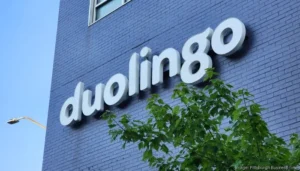Duolingo, the popular language-learning platform, has announced a major shift toward becoming an AI-first company.
This transition will gradually replace contract workers with artificial intelligence (AI) tools.
CEO Luis von Ahn outlined the company’s vision in an internal email.
He emphasized that AI will play a central role in content creation, hiring decisions, and performance evaluations.
While the transition is expected to enhance efficiency, it has also sparked concerns about the impact on human jobs.
Duolingo AI-First Strategy
Luis Von Ahn’s email, which was later shared publicly, detailed several structural changes aimed at integrating AI into Duolingo’s operations. The company will:
- Reduce reliance on contract workers for tasks that AI can handle.
- Prioritize AI skills in future hiring decisions.
- Evaluate employees based on AI usage in their workflows.
- Limit new hires unless a team can prove that automation is not a viable alternative.
The CEO compared this shift to Duolingo’s 2012 decision to become mobile-first.
He stated that AI will enable the company to scale content exponentially and enhance learning experiences for users.
Impact on Duolingo Contract Workers
Duolingo has already begun phasing out contract workers, with reports indicating that 10% of contractors were let go in early 2024 due to AI adoption.
While the company insists that this transition is not about replacing employees, critics argue that the move could lead to job losses in the ed-tech sector.
Von Ahn defended the decision, stating that AI will eliminate repetitive tasks, allowing employees to focus on creative work and real-world problem-solving.
However, concerns remain about the quality of AI-generated content and whether automation can fully replace human expertise.
Industry-Wide AI Adoption
Duolingo’s AI-first approach mirrors similar strategies adopted by Shopify, Amazon, and Google, where companies are increasingly automating tasks to improve efficiency.
Shopify CEO Tobi Lütke recently announced that teams must justify why AI cannot handle a task before requesting additional headcount.
The broader trend of AI replacing human workers has raised ethical concerns, with experts warning that millions of jobs could be affected globally.
A Goldman Sachs report estimated that AI could replace the equivalent of 300 million full-time jobs, while a McKinsey study suggested that 14% of the global workforce may need to change careers due to AI advancements.
Employee and Public Reactions
The announcement has sparked mixed reactions among employees and the public. While some see AI as a productivity booster, others fear that human expertise will be undervalued.
Critics argue that AI-generated lessons may lack the depth and accuracy of human-created content, particularly for less common languages.
Social media users have voiced concerns, with one commenter stating, “AI-first actually means you do NOT care deeply about your employees.”
Others worry that Duolingo’s quality may decline, as AI-generated lessons could introduce errors and inconsistencies.
Note: We are also on WhatsApp, LinkedIn, Google News, and YouTube, to get the latest news updates, Subscribe to our Channels. WhatsApp– Click Here, Google News– Click Here, YouTube – Click Here, and LinkedIn– Click Here.



